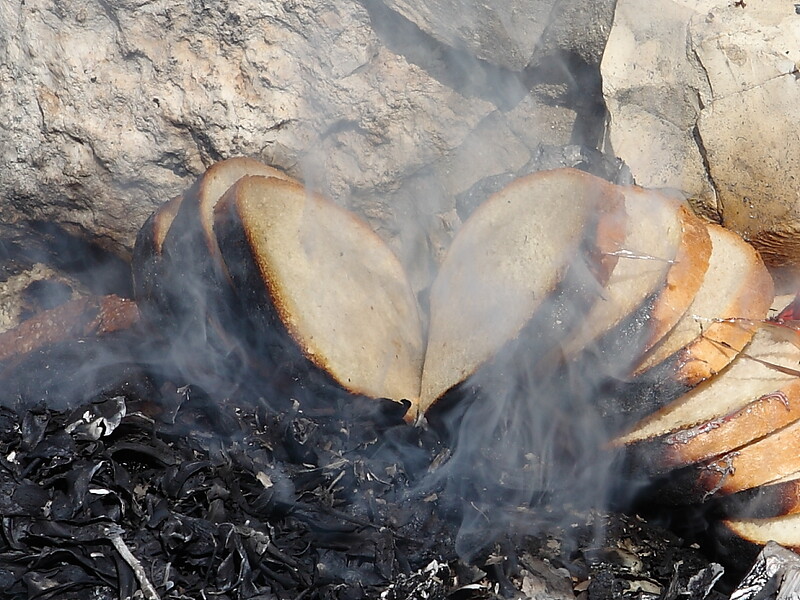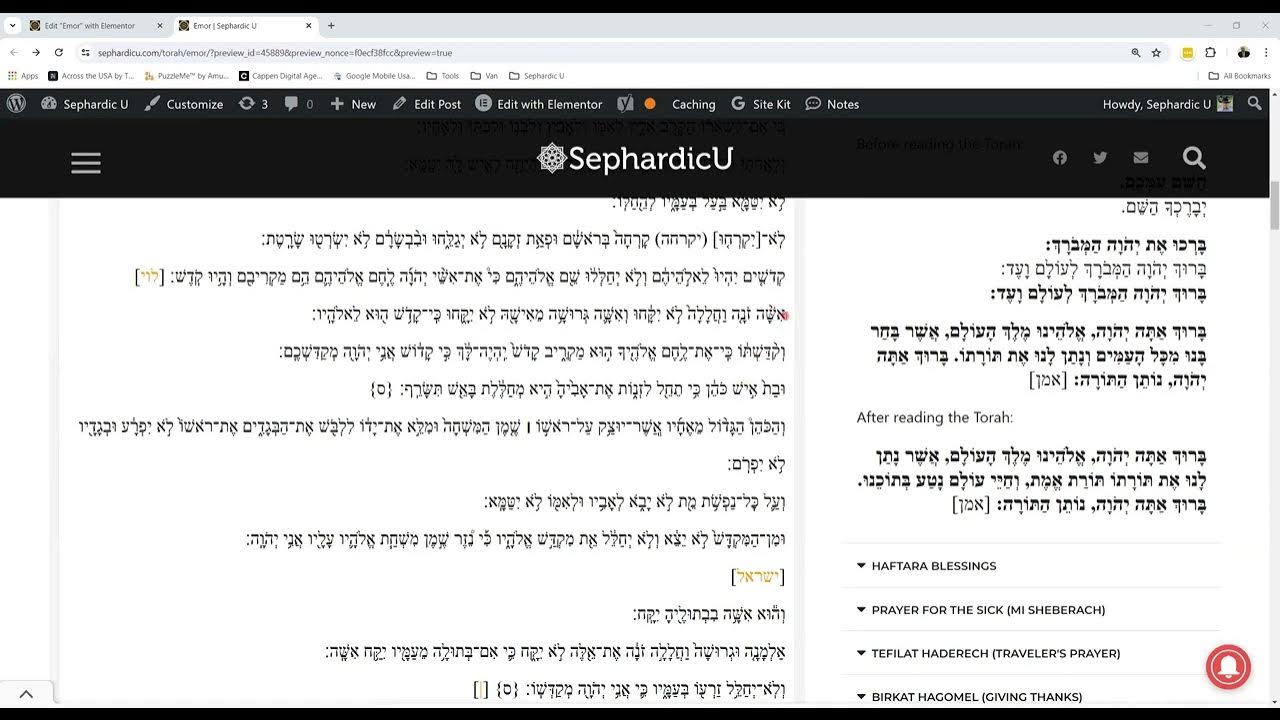
Un cop els Fills d’Israel travessen el Mar de les canyes, es queixen que tenen set. Després arriben a Elim, on hi havia dotze fonts d’aigua i setanta palmeres (Xemot, Èxode, 15:24-27). Des d’Elim viatgen fins al desert de Sin, entre Elim i el Sinaí.
Allà, un més just després de sortir de Mitsraïm, els Fills d’Israel al complet es queixen a Moisès i Aaron: «Si tan sols haguéssim mort per la mà del [nom de les quatre lletres] a la terra de Mitsraïm, mentre seiem al costat del pot de carn, quan menjàvem pa fins a sadollar-nos, ja que vosaltres ens heu portat a aquest desert per matar aquesta congregació sencera de gana» (Xemot, Èxode, 16:1-3).
Sense necessitat que Moisès traslladi la queixa, [el nom de les quatre lletres] avisa a Moisès: «Jo faré ploure menjar del cel; que tothom surti i reculli la seva part del dia cada dia […] i serà que el sisè dia quan preparin el que han portat, serà el doble del que recullen cada dia» (Xemot, Èxode, 16:4-5).
Com és que el Sant, beneït sigui, actua sense intermediació de Moisès —no és que li faci falta— per dir que farà ploure menjar del cel? Doncs perquè els Fills d’Israel no sabien menjar. No tenien bons hàbits alimentaris. O més aviat, no en tenien cap, d’hàbit. Com esclaus, simplement seien «al costat del pot de la carn» i menjaven. Quan els ho deien. O pitjor encara, quan tenien gana anaven a buscar l’olla i en menjaven, com els animals.
Per tant, calia ensenyar a menjar als Fills d’Israel. Moisès i Aaron diuen als Fills d’Israel: «Al vespre, vosaltres sabreu que [el nom de les quatre lletres] us va treure de la terra de Mitsraïm. I al matí veureu la glòria del [nom de les quatre lletres] , que Ell ha escoltat les vostres queixes contra [el nom de les quatre lletres]…» (Xemot, Èxode, 16:6-7).
«Al vespre, i vosaltres sabreu». Que sigui voluntat del cel, explica el mestre Sforno com si fos Moisès qui parlés, que la promesa de donar-vos menjar sigui tal que el Sant, beneït sigui, us doni les vostres necessitats del vespre a l’hora del vespre, per tal que pugueu saber que el Sant us ha alliberat totalment de la terra de Mitsraïm, incloent-hi els seus costums. Allà seieu al costat de les olles i pots de carn sense tenir una hora determinada per a menjar, com els animals. «I al matí» tindreu el vostre menjar del matí. «Llavors veure la glòria del [nom de les quatre lletres]», i que sigui la voluntat del Cel que veieu la glòria del Sant, beneït sigui, quan estableixi aquests moments per menjar (Ovadiah ben Jacob Sforno, Commentary on the Torah, traduït i comentat per Rabí Raphael Pelcovitz, p. 362).
Però no només s’ensenyen hàbits en forma d’ordenar el dia per menjar en determinats moments i no quan es tingui gana. Els Fills d’Israel a més de quan menjar, han d’aprendre com fer-ho. Al vespre, el Sant, beneït sigui, els donarà carn, però no al nivell de quedar plens i tips, com era costum de Mitsraïm, on els seus habitants no tenien cap més interès que satisfer les seves necessitats físiques. Al matí, el Sant els donarà pa, però només en quantitat per satisfer la gana (Ovadiah ben Jacob Sforno, pp. 363).
El primer que reben els Fills d’Israel, inclús abans de ser persones lliures és el calendari. Han de començar a aprendre a gestionar-se el seu temps. I això inclou també aprendre a posposar algunes coses, com les hores per menjar.
Una de les formes que millor demostren el grau de maduresa de qualsevol persona és veure com i què compra als supermercats, i com menja a casa. Tots hem passat per l’època, just marxar de casa dels pares, en què hem comprat qualsevol cosa per menjar, i ho consumíem a casa quan ens venia de gust. És la típica acció de rebel·lia: a casa nostra manem nosaltres i dinem i sopem quan volem.
Tanmateix aquesta actitud i aquests hàbits, a la llarga, no ens són bons. Cal aprendre no només com cuinar. Cal aprendre a mantenir uns hàbits d’alimentació saludables. A menjar a unes hores aproximades, i a fer-ho de forma normal. Sense buscar un empatx a cada àpat. Cal menjar per viure, i no viure per menjar.
En la nostra època de moment encara podem comprar quantitats ingents de productes perquè volem i podem. En tenim la capacitat i a vegades ho fem servir com una mostra d’estatus social.
Potser la kaixrut no només tracta de les coses que podem menjar, i de com les preparem. Potser també s’aplica a com ho comprem. Tenint en compte que d’aquí poc més de dos mesos tornarem a rememorar la sortida de Mitsraïm, cal llençar quilos i quilos de menjar en forma de hamets? Que puguem comprar molt menjar, implica que obligatòriament s’hagi de fer, encara que després se’ns faci malbé a la nevera o s’hagi de cremar, vendre, o regalarà, per què és hamets i no el podem tenir a casa? Realment mengem per viure, o vivim per menjar?
Once the Children of Israel crossed the Sea of Reeds, they complained that they were thirsty. Then they came to Elim, where there were twelve springs of water and seventy palm trees (Shemot 15:24-27). From Elim they traveled to the wilderness of Sin, between Elim and Sinai.
There, after leaving Mitsraim, the Sons of Israel complained to Moses and Aaron: «if only we had died by the hand of the Lord in the land of Egypt, when we sat by pots of meat, when we ate bread to our fill! For you have brought us out into this desert, to starve this entire congregation to death» (Shemot 16: 1-3).
Without the need for Moses to convey the complaint, God warns Moses: «I am going to rain down for you bread from heaven, and the people shall go out and gather what is needed for the day […] on the sixth day that when they prepare what they will bring, it will be double of what they gather every day»(Shemot 16: 4-5).
How is it that the Holy One, blessed be, acts without the intercession of Moses — not that he needs it — to say that it will rain down food from heaven? Because the children of Israel did not know how to eat. They didn’t have good eating habits. Or rather they had none of them. As slaves they simply sat «beside the pot of meat» and ate when they were told. Or worse: when they were hungry they would fetch the pot and eat it, like animals.
The children of Israel had to be taught to eat. And Moses and Aaron said unto the Children of Israel, «[In the] evening, you shall know that the Lord brought you out of the land of Egypt. And [in the] morning, you shall see the glory of the Lord when He hears your complaints against the Lord […]» (Shemot 16: 6-7).
«In the evening, and you will know.» May it be the will of heaven, explains Rabi Sforno as if it were Moses who spoke, may the promise to give you food be in such a manner that the Blessed One will give you your needs of the evening at evening time, so that you may know that the Blessed One has delivered you totally from the land of Mitsraim, including its customs. There you sat at the pots of flesh without a set time to meals, like animals. «And in the morning» you will have your morning food.
«Then you shall see the glory of Hashem». And so may it be the will of Heaven that you see the glory of the Holy One, blessed be, when Hashem comes to establish these times for food (Ovadiah ben Jacob Sforno, Commentary on the Torah, translated and commented on by Rabbi Raphael Pelcovitz, pp. 362).
But it is not just a matter of learning to eat at certain times and not when you are hungry. The children of Israel, in addition to eating, must learn how to eat. In the evening, the Blessed One will give them flesh but not at the level of being full and tipsy, as was the custom of Mitsraim, where its inhabitants had no other interests than to satisfy their physical needs. In the morning, the Holy One will give them bread, but only in to satisfy their hunger (Ovadiah ben Jacob Sforno, pp. 363).
The first thing the children of Israel receive, even before they are free, is the calendar. They need to start learning how to manage their time. That includes learning to postpone some things, such as eating hours.
One of the best ways to discover signs of maturity in any person is how and what they buy in the supermarket, and how they eat at home. We’ve all been through the time just leaving our parents’ house, buying anything to eat, and consuming it at home when we feel like it. It is the typical act of rebellion: our hous, our rules and our eating times.
But this attitude and these habits are not good for us in the long run. You need not only how to cook, but also to maintain healthy habits. Eating at a time and do it normally. Without stuffing oneself at every meal. You have to eat to live, not live to eat.
In our age we can buy huge amounts of food because we want and can. We have the capacity and sometimes we do it as a sign of social status.
Maybe kashrut is not just about the things we can eat, and how we prepare them. It may also apply to how we buy them. In a couple of months we will be reminding ourselves of the departure from Mitsraim. Do we have to throw away pounds and pounds of food in the form of hamets? Does being able to buy a lot of food mean that it has to be done, even if it gets bad in the fridge; ends up burned, sold or given away, because it is a hamets and we can’t have it at home? Do we really eat to live, or do we live to eat?







Parashat Behar – Weekday Torah Reading (Moroccan TeAmim)